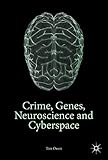Crime, Genes, Neuroscience and Cyberspace [electronic resource] / by Tim Owen.
Material type: TextPublisher: London : Palgrave Macmillan UK : Imprint: Palgrave Macmillan, 2017Description: XIII, 232 p. online resourceContent type: text Media type: computer Carrier type: online resourceISBN: 9781137526885Subject(s): Neurosciences | Critical criminology | Criminology | Computer crimes | Criminology and Criminal Justice | Criminological Theory | Cybercrime | Critical Criminology | NeurosciencesAdditional physical formats: Printed edition:: No titleOnline resources: e-book Full-text access
In:
Springer eBooksSummary: This book applies Owen's unique genetic-social framework to the study of crime and criminal behaviour, with an emphasis on cybercrime. Moving beyond challenges which confront contemporary criminological theorizing such as: the stagnation of critical criminology, the relativistic nihilism of the 'cultural turn', posthumanism, and virtual criminology, the author codifies and 'applies' the latest version of the framework to the study of crime, both in and out of cyberspace. Drawing upon evolutionary psychology, behavioural genetics and the philosophy of Heidegger, he introduces new terms such as 'Neuro-Agency' and notions of Embodied Cognition into criminological theorizing. Adopting a soft compatibilist approach to free-will, and Realist ontology, Owen's meta-theoretical focus provides a new direction for criminological theorizing, in particular in the direction of the conceptualization and prediction of cyber violence. Exciting and timely, this book will appeal to scholars and advanced students of criminology, law, sociology, social policy, psychology, philosophy, policing and forensic investigation.
TextPublisher: London : Palgrave Macmillan UK : Imprint: Palgrave Macmillan, 2017Description: XIII, 232 p. online resourceContent type: text Media type: computer Carrier type: online resourceISBN: 9781137526885Subject(s): Neurosciences | Critical criminology | Criminology | Computer crimes | Criminology and Criminal Justice | Criminological Theory | Cybercrime | Critical Criminology | NeurosciencesAdditional physical formats: Printed edition:: No titleOnline resources: e-book Full-text access
In:
Springer eBooksSummary: This book applies Owen's unique genetic-social framework to the study of crime and criminal behaviour, with an emphasis on cybercrime. Moving beyond challenges which confront contemporary criminological theorizing such as: the stagnation of critical criminology, the relativistic nihilism of the 'cultural turn', posthumanism, and virtual criminology, the author codifies and 'applies' the latest version of the framework to the study of crime, both in and out of cyberspace. Drawing upon evolutionary psychology, behavioural genetics and the philosophy of Heidegger, he introduces new terms such as 'Neuro-Agency' and notions of Embodied Cognition into criminological theorizing. Adopting a soft compatibilist approach to free-will, and Realist ontology, Owen's meta-theoretical focus provides a new direction for criminological theorizing, in particular in the direction of the conceptualization and prediction of cyber violence. Exciting and timely, this book will appeal to scholars and advanced students of criminology, law, sociology, social policy, psychology, philosophy, policing and forensic investigation.
| Item type | Current library | Collection | Call number | Copy number | Status | Notes | Date due | Barcode |
|---|---|---|---|---|---|---|---|---|
| E-Books | MEF eKitap Kütüphanesi | Springer Nature | XX(1420245.1) (Browse shelf (Opens below)) | Available | NATURE | 1420245-1001 |
This book applies Owen's unique genetic-social framework to the study of crime and criminal behaviour, with an emphasis on cybercrime. Moving beyond challenges which confront contemporary criminological theorizing such as: the stagnation of critical criminology, the relativistic nihilism of the 'cultural turn', posthumanism, and virtual criminology, the author codifies and 'applies' the latest version of the framework to the study of crime, both in and out of cyberspace. Drawing upon evolutionary psychology, behavioural genetics and the philosophy of Heidegger, he introduces new terms such as 'Neuro-Agency' and notions of Embodied Cognition into criminological theorizing. Adopting a soft compatibilist approach to free-will, and Realist ontology, Owen's meta-theoretical focus provides a new direction for criminological theorizing, in particular in the direction of the conceptualization and prediction of cyber violence. Exciting and timely, this book will appeal to scholars and advanced students of criminology, law, sociology, social policy, psychology, philosophy, policing and forensic investigation.
5
